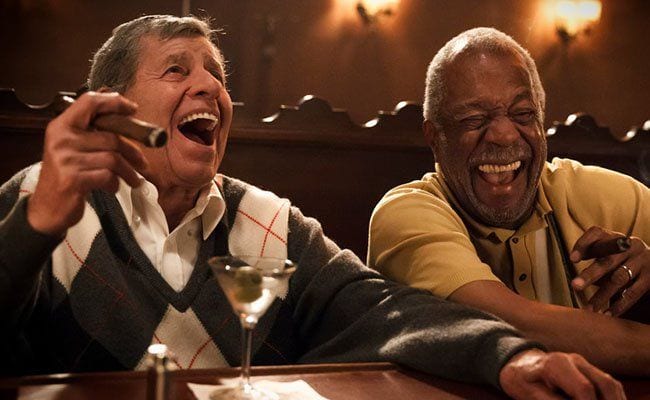
It’s good to see Jerry Lewis again, even if the King of Slapstick is restrained by the decidedly somber drama, Max Rose. This largely middling affair is sprinkled with moments of perceptive beauty and a impressive performance from Lewis. Unfortunately, writer-director Daniel Noah can’t generate any forward momentum, mostly due to the ham-fisted anchors that are dragging his story down. There are some interesting observations about the nature of loss and aging, but you’ll probably be too bored to notice them.
Sixty years ago, Max Rose was a jazz pianist with a bright future. He had big dreams, an even bigger ego, and a hit record called, Hurry Home. He also had a beautiful wife named Eva (Claire Bloom), who supported him through the ups and downs of the mercurial music business.
Now, everything that Max loved is dead and gone. His dreams of musical conquest are a distant memory. In fact, Max doesn’t play a single note on the piano during the entire film. Eva, who stuck by him for 65 years of marriage, has recently died. Worse still, Max discovers a memento hidden in Eva’s belongings that suggests she was pining for a secret lover. In a heartbreaking (and awkward) funeral eulogy, Max laments, “For 65 years, her life with me was a lie. I’m a failure as a husband.”
Yes, if you’re waiting for Lewis to adopt a goofy grin and scream, “Lady!” you’re in for a long ride.
We’ve seen Lewis play self-absorbed sad-sacks before, most notable in Scorsese’s brilliant The King of Comedy (1982). Max Rose is like Jerry Langford after 30 years of soul-crushing beat-downs. He discovered, perhaps too late, that giving and sharing love was the only true measure of success. Lewis slips easily into the curmudgeonly role; he understands bitter sarcasm and stifling silence like he understands a good pratfall. There’s little doubt that his name will be circulating come Oscar time, though his eligibility may be jeopardized by an early cut of Max Rose playing at Cannes in 2013.
The problems with Max Rose are legion, and nearly all of them reside in its jumbled script and lethargic pacing. Noah, better known for his prowess as a producer (2016’s a The Greasy Strangler and 2014’s A Girl Walks Home Alone at Night), feels out of his element as both a writer and a director. His script jumps haphazardly through time, making it unclear if Max’s conversations with Eva are flashbacks or hallucinations. Perhaps it doesn’t matter, but it adds unnecessary confusion to a storyline striving for convincing realism.
In fact, the one saving grace of Noah’s script is his steadfast refusal to add any Hollywood flourishes. Rather than jumping into a Winnebago and tracking down some quirky closure (ala 2002’s About Schmidt), Max gets shuttled into a nursing home by his ne’er-do-well son (Kevin Pollak). It’s a brave choice by Noah, who looks the specter of senility squarely in the eye and doesn’t blink. Old people don’t go on vision quests in America; they get locked up by disgruntled relatives.
Sadly, Noah’s rejection of Hollywood flourishes doesn’t translate into anything new. Instead, he goes the familiar route. We get the estranged son and judgmental father searching for a common ground. Max goes through the 7 Stages of Grief in a grueling opening act that will test even the most patient of cinephiles. Finally, there are epiphanies about community and companionship that feel like they came straight from the inside of a Hallmark card.
The pacing, too, has you counting the minutes until something… anything… happens. Max’s quest to find Eva’s lover (Dean Stockwell) is more like a leisurely stroll. True, Max is nearly 90 years old, but the script shouldn’t move as slow as he does! There’s an important story to be told here — one of finding identity and purpose after your life-long partner is gone — but Noah hedges his bets with a half-hearted plot device in order to keep things lurching forward.
Fortunately, there are a few delightful moments to (kind of) hold your attention along the way. The scenes involving Max and his loyal granddaughter, Annie (Kerry Bishé), are a particular highlight. Annie and Max share an emotional shorthand that has eluded Max and his own son. More importantly, they get each other’s corny jokes. Their scenes together are tender and genuine; hinting at the nuanced story Noah was trying to tell.
Lewis also gets a few moments of comic relief, thanks to the welcome addition of cinematic luminaries Rance Howard, Lee Weaver, and Mort Sahl. The booze flows freely as Max and his merry band of retirees jam out to old jazz records and re-live their past triumphs. These scenes, while not directly related to Max’s search for his wife’s beau, infuse some much needed life and energy into the otherwise drab proceedings.
There’s a heartfelt story hiding somewhere in Max Rose. It’s clear that Noah has a lot on his mind, but he’s not quite sure how to say it all. The affection we ultimately feel for Max is a testament to Lewis’s towering performance. Still, this feels like a wasted opportunity to tell a valuable story. To get 65 wonderful years with one person is a gift; to find perspective on those 65 years is truly a treasure.


![Call for Papers: All Things Reconsidered [MUSIC] May-August 2024](https://www.popmatters.com/wp-content/uploads/2024/04/all-things-reconsidered-call-music-may-2024-720x380.jpg)



